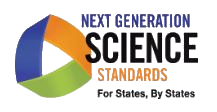 Welcome to the Illinois State Board of Education's Science Learning Standards webpage! We are dedicated to equipping science teachers with the essential resources and support needed to cultivate a dynamic and innovative learning environment for their students. Our commitment extends to offering instructional materials, comprehensive resources, and professional learning opportunities. We want to support teachers to help them design engaging science experiences that not only meet rigorous academic standards but also ignite a lifelong passion for discovery and exploration in their students.
Welcome to the Illinois State Board of Education's Science Learning Standards webpage! We are dedicated to equipping science teachers with the essential resources and support needed to cultivate a dynamic and innovative learning environment for their students. Our commitment extends to offering instructional materials, comprehensive resources, and professional learning opportunities. We want to support teachers to help them design engaging science experiences that not only meet rigorous academic standards but also ignite a lifelong passion for discovery and exploration in their students.
 Illinois Learning Standards for Science
Illinois Learning Standards for Science
Important Announcement
The ISBE Science Professional Development Committee invites you to take a few minutes to complete a brief needs assessment survey to better understand your professional learning needs.
Your input is essential. By sharing your perspectives, you’ll help us focus our energy on enhancing science knowledge and instructional practices that directly support educators and district leaders — ultimately improving outcomes for students across Illinois.
Why participate?
- Influence future science PD offerings.
- Ensure training is relevant and impactful.
- Help build a stronger science education community statewide.
Thank you for your commitment to science education and for helping us better serve Illinois educators and students.
